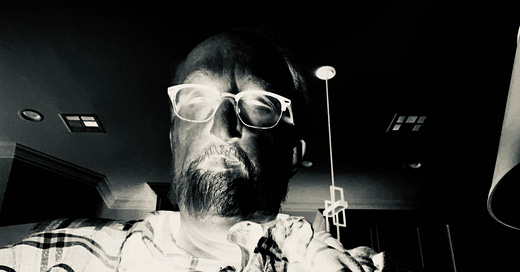Those who sow in tears shall reap with shouts of joy. Though [they go] along weeping, carrying the seed-bag, [they] shall come back with songs of joy, carrying [their] sheaves.
Psalm 126: 5-6 (JPS, 1985, via Sefaria.org)
Though he lived in the 18th century, William Blake is a poet for our time. I am meditating on The Proverbs of Hell, from his illuminated work The Marriage of Heaven and Hell, to explore the relationship of poetry to prayer and prophecy.
I have a confession: I can’t remember the last time I felt Joyful. Sorrow, yes, that’s easy: I felt profound sorrow after my brother died. There have been times I’ve felt so down, it seemed like up to me (to paraphrase Richard Farina). Failing to find a relevant recent experience, I felt like an imposter writing about joy. That’s why it’s been so hard to write, and to finish, this essay.
But Joy was prominent in the news the summer of 2024. I’m referring to Sunday afternoon, July 21. What’s significant about this time of joy is that you might say it happened within minutes: one minute, President Biden announced that he was withdrawing his candidacy; a few minutes later, he endorsed the candidacy of Kamala Harris, his Vice President. Immediately, donations in the millions were raised for Ms. Harris. This groundswell of support felt like a moment of wide-spread civic joy.
So, the sorrow of our limited electoral choices planted seeds, which drew forth a change. And that joy was shared and spread. “Joys impregnate,” as Blake puts it. In other words, joy is increased through sharing. A joy shared is a joy more than doubled.
As I say, financial support was a means to express joy. And a means to support joy. To prolong and preserve the joy. It’s a human symptom: we want joy to be everlasting, but joy is briefer than happiness, which is all too often contingent on outside circumstances. Fundamentally, joy is an expression of awe — which can only be expressed in finite moments. No human, it is said, can look upon the fullness of divinity (or joy) and live.
Or, as Blake put it:
He who binds himself to a joy
Does the winged life destroy
He who kisses the joy as it flies
Lives in eternity’s sunrise
So, this understandable desire to cling to joy will kill it. We cannot buy joy. We cannot cause joy to be everlasting.
As Ingrid Fetell Lee has noted, psychologists describe joy as an “intense, momentary experience of positive emotion — one that makes us smile and laugh and feel like we want to jump up and down.”
goes further:Joy is not happiness, even though the two are related. Joy is delight, gladness, and pleasure — a deep inner wellspring of contentment and comfort. It is a disposition, an outlook, and maybe even a purposeful practice. Happiness is what we feel in relation to external conditions; joy is experienced regardless of circumstances. A wise maxim says, ‘We pursue happiness, we choose joy.’
But that moment of elation was quickly overcome by November’s election result, which disappointed about 51% of the voting public. Again, sorrow was brought forth. Like some cyclothemic disorder, we swung from joy back to sorrow.
In fact, the emotion was more than sorrow — it was depression. If, as it is said, depression is anger directed inwards, this depression encompassed anger toward one’s fellow citizens, and mourning for the dream of America. We experienced emotional whiplash.
This real-life moment illustrates Blake’s notion that the opposites of joy and sorrow are intertwined: “Joy and Woe are woven fine / A Clothing for the soul divine / Under every grief & pine / Runs a joy with silken twine” (Auguries of Innocence).
Joy and sorrow are extremes of human emotion: joy is something more profound than happiness; sorrow, something deeper than sadness.
It would be easy to become trapped by this moment of sorrow. It would be easy to fall deeper, to be consumed by despair. We struggle to find the joy entwined with this present sorrow.
In her TED Talk, Ms. Lee describes an informal survey she conducted, asking random people what gave them joy: “cherry blossoms and bubbles ... swimming pools and tree houses ... hot air balloons and googly eyes — and ice cream cones, especially the ones with the sprinkles.”
So, we can be on the lookout for those things. We don’t deny the present moment; we walk with our sorrow, while keeping our hearts open for those moments of joy. It is not wise to seek joy; this is too close to trying to cling to it. But we can remain open to joy. We cannot afford to deny the possibility of joy.
As Ms. Bass says, we choose joy. If, as Blake says, the two are entwined, we have the ability — moment to moment — to choose between sorrow and joy. I don’t place a value judgment on that choice, and neither would Blake.
Both joy and sorrow are part of the human condition. To deny or ignore one is to lose both. If they are entwined, then sorrow is just as temporary as joy. Joy may be but a moment, but so is sorrow. Despair is the delusion that joy will never return, that there is no hope for joy.
This is the time to be open to joy. To remember those moments that have given us joy in the past. To choose joy over despair. Let us acknowledge and accept our moments of sorrow, but never confuse that for a permanent condition. Let us be aware of its bright twin, that thread of joy just beyond the dark curtain.



